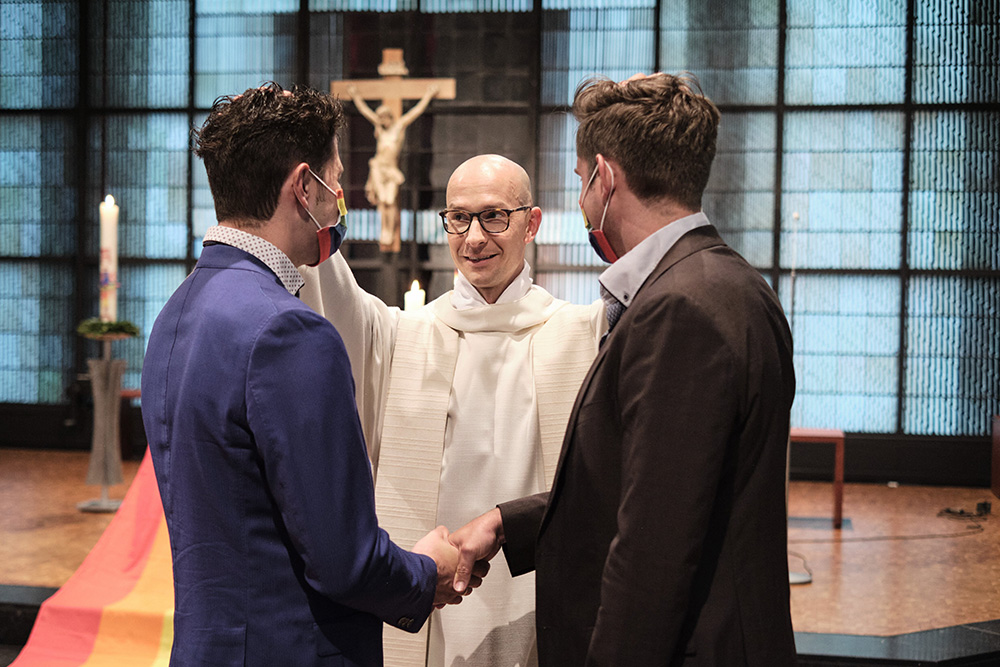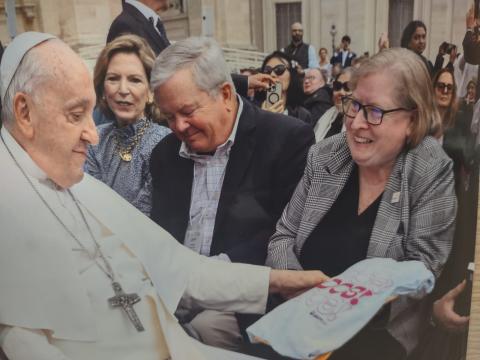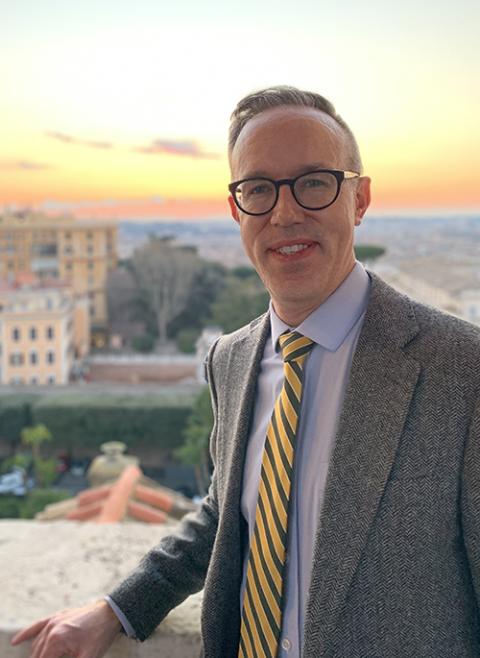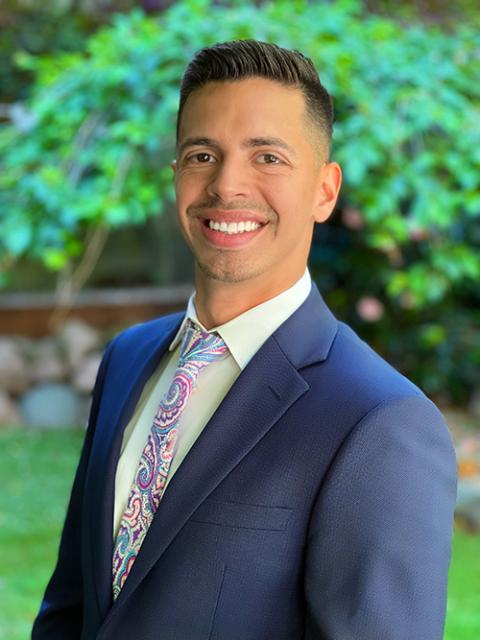
Fr. Christian Olding blesses a gay couple during the blessing service "Love Wins" in the Church of St. Martin in Geldern, Germany, May 6, 2021. (OSV News/KNA/Rudolf Wichert)
Theologians and LGBTQ+ advocates greeted with mixed emotions the unexpected Dec. 18 declaration from the Vatican's doctrinal office that Catholic priests could bless same-sex couples, as well as divorced and remarried couples.
"It's a big, small step forward," said Brian Flanagan, a gay Catholic theologian and senior fellow at New Ways Ministry, an LGBTQ+ Catholic advocacy organization.
"Some of the headlines ran too far too fast because it's a very specific and limited declaration," Flanagan said.
But he also said that the declaration has "deep pastoral implications for Catholics around the world, especially in places that currently don't have civil same-gender marriage at all."
Flanagan emphasized "the number of people who might give their relationship to Christ and their relationship to the Church a second thought, a more open thought, who might feel welcome now in a church in a way they would not have otherwise."
He continued, "I think it's a huge move."
Marianne Duddy-Burke, a married lesbian and executive director of DignityUSA, an LGBTQIA+ Catholic organization, said, "This is going to be remembered as a historic day in the movement towards full equality and affirmation of LGBTQ+ people in our church."
Duddy-Burke emphasized that this was not the "end point" of the "long journey towards full equality and full affirmation." But, she said, "I do think it's important for us to stop and celebrate the milestones along that journey, and this feels like a significant milestone."

Pope Francis greets Marianne Duddy-Burke in St. Peter's Square Oct. 25, 2023, at the Vatican. (Courtesy of Marianne Daddy-Burke)
"I'm just so grateful to all of the people throughout the decades who have told their stories and lived openly and who have fought to maintain their place in the church," said Duddy-Burke, who earlier this year was invited to speak in a Catholic church for the first time since 1986.
The document from the Vatican's Dicastery for the Doctrine of the Faith comes just two years after the same office declared in 2021 that same-sex unions could not be blessed because God "cannot bless sin."
Duddy-Burke called the change "the blink of an eye in Vatican time." The reversal, she said, showed that church officials had recognized the way that the original statement had harmed LGBTQ+ Catholics and their families and that Vatican officials were taking " seriously their role as shepherds to all people."
Duddy-Burke also highlighted the significance of the declaration to the Catholic families of LGBTQ+ people who now might feel less tension between church teaching and their love for their family members.
'It's important for us to stop and celebrate the milestones along that journey, and this feels like a significant milestone.'
—Marianne Duddy-Burke
Jesuit Fr. Bruce Morrill, the Edward A. Malloy Chair in Roman Catholic Studies at Vanderbilt University, said that the declaration was consistent with Francis' pastoral focus and his impulse toward accompaniment and inclusion throughout his papacy.
Morrill noted that the declaration seems "careful" to limit these sanctioned blessings of same-sex relationships within "very narrow parameters" to spontaneous occasions, such as when ministers are approached after Mass, or unexpectedly in public.
But what the declaration doesn't acknowledge, Morrill said, is that for many Catholics and others in their understanding of Catholicism, "the notion of receiving a blessing, requesting and being graced or honored with a blessing, is an endorsement."
"People are looking for validation. Or it's a desire for a sense of self worth and dignity," Morrill said.
Morrill also said that conservative Catholics may worry that this is a step toward official blessing rituals for people in irregular marriages or in same-sex relationships, even though the document is very clear to dispute that possibility.
They may also worry that the "very nature of blessings" implies that "this relationship itself is good in itself as it is." But Morrill said the document is "going out of its way to say it's not endorsing the relationship itself."
Nevertheless, most Catholics don't make fine theological distinctions, Morrill said, citing the high levels of confusion about teachings on papal infallibility as an example. This lack of nuance may mean that Catholics don't understand the difference between these blessings and sacraments, he said.
The U.S. Conference of Catholic Bishops emphasized the distinction between sacramental blessings and pastoral blessings in its statement about the declaration.
Advertisement
"The Church’s teaching on marriage has not changed, and this declaration affirms that, while also making an effort to accompany people through the imparting of pastoral blessings, because each of us needs God’s healing love and mercy in our lives," the statement said, quoting a spokesperson.
In contextualizing the declaration, Flanagan said, "We are not at a point in the Catholic church where we could have any kind of approach and consensus on how to respond officially to same-sex marriage all the time. But I think this really provides a lot of freedom for the people closest to folks on the ground to use their best pastoral judgment as to how to make sure that people know that they're loved and welcomed in the church."
Flanagan also called the pope's move with the declaration "strategic."
The theologian explained, "This is as much to put the brakes on what the German and Belgian bishops have been discussing as possibilities in terms of a formal, ritualized, standardized blessing of same-sex partners," referring to the document's prohibition of "ritual" blessings for couples in "irregular situations."
Ish Ruiz, a postdoctoral fellow of Catholic studies at Emory University and a gay Latinx theologian, said he felt "incredible joy" at the announcement about the blessings. "They've opened up space for us to take up more room and transform the church through our witness," Ruiz said.
Ruiz said that he, like many in the LGBTQ+ community, felt disappointed that "the blessings in the document are framed as a way to assist LGBTQ+ people with their sinful lifestyles," a continuation of church teaching. That stance, Ruiz said, "is missing the grace that can be present in loving same-sex unions."
Even with that disappointment, Ruiz encouraged same-sex couples to reach out to their priests for a blessing.
"The Catholic faith, more than in a set of documents, is really contained in the lived experiences of the faithful," Ruiz said.
"I'm hopeful that the faithful in practice will probably continue to do what they've been doing all along, which is ignore these teachings that claim" that "our love is somehow lesser," he said.






